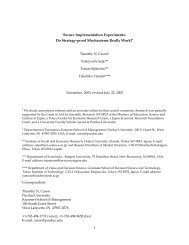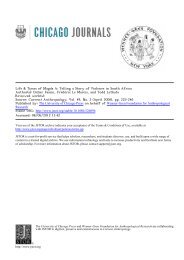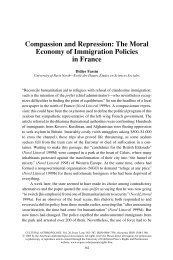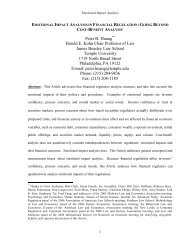The Tools of the Master Slavery and Empire in Nineteenth Century ...
The Tools of the Master Slavery and Empire in Nineteenth Century ...
The Tools of the Master Slavery and Empire in Nineteenth Century ...
Create successful ePaper yourself
Turn your PDF publications into a flip-book with our unique Google optimized e-Paper software.
THE TOOLS OF THE MASTER 3<br />
Kitchener, <strong>the</strong> sirdar <strong>of</strong> Egypt, suggested that Ali Pasha Sherif’s harem be searched for three<br />
o<strong>the</strong>r slaves. Dur<strong>in</strong>g this search, “white women [would be] identified by <strong>the</strong>ir h<strong>and</strong>s <strong>and</strong><br />
allowed to pass without be<strong>in</strong>g exam<strong>in</strong>ed.” 3 In <strong>the</strong> eyes <strong>of</strong> <strong>the</strong>se <strong>of</strong>ficials, <strong>the</strong> black h<strong>and</strong>s <strong>and</strong><br />
black sk<strong>in</strong> <strong>of</strong> any woman liv<strong>in</strong>g <strong>in</strong> an Egyptian household automatically signified a slave;<br />
black women <strong>in</strong> Egyptian homes could thus only have been brought <strong>the</strong>re <strong>in</strong> a state <strong>of</strong> crim<strong>in</strong>ally<br />
<strong>in</strong>duced bondage. So heightened had racial sensitivity become for <strong>the</strong> British that<br />
even <strong>the</strong> unauthorized presence <strong>of</strong> unmarried black women on <strong>the</strong> streets <strong>of</strong> cities like Cairo<br />
sounded alarms. Foreign Office <strong>of</strong>ficials registered <strong>the</strong>ir fears that, once freed from slavery,<br />
black Sudanese women with few skills <strong>and</strong> fewer familial connections would fall back <strong>in</strong>to<br />
<strong>the</strong> clutches <strong>of</strong> Muslim households, prey once more to ei<strong>the</strong>r slavery, concub<strong>in</strong>age or prostitution.<br />
To circumvent this, <strong>the</strong> Home for Freed Black Slave women which was founded <strong>in</strong><br />
Cairo <strong>in</strong> 1886 to help situate freed Sudanese <strong>and</strong> Ethiopian women <strong>in</strong> appropriate domestic<br />
employment. 4<br />
A different sensitivity to color <strong>in</strong>formed Egyptians’ sense <strong>of</strong> servitude. Documents <strong>of</strong><br />
mid-n<strong>in</strong>eteenth century court cases exist which show that blacks who could not prove <strong>the</strong>ir<br />
free status were <strong>of</strong>ten taken by <strong>the</strong> Cairo police back to <strong>the</strong> slave market <strong>in</strong> <strong>the</strong> Khan al-<br />
Khalili district <strong>of</strong> <strong>the</strong> city. 5 But as <strong>the</strong>se markets were <strong>in</strong>creas<strong>in</strong>gly closed down, it seems that<br />
subtler factors than sk<strong>in</strong> color <strong>in</strong>dicated <strong>the</strong> physical <strong>and</strong> social marks <strong>of</strong> enslavement. As<br />
Terence Walz’s research shows, <strong>the</strong> owners <strong>of</strong> Sudanese slaves always provided <strong>the</strong>m with a<br />
particular type <strong>of</strong> cloth<strong>in</strong>g. As became clear dur<strong>in</strong>g <strong>the</strong> testimony <strong>of</strong> witnesses who were<br />
questioned about <strong>the</strong> com<strong>in</strong>gs <strong>and</strong> go<strong>in</strong>gs <strong>of</strong> <strong>the</strong> slave women from <strong>the</strong> Pashas’ houses, it was<br />
this cloth<strong>in</strong>g that made <strong>the</strong> slaves immediately recognizable. 6<br />
For <strong>in</strong>stance, dur<strong>in</strong>g <strong>the</strong> trial,<br />
a defense lawyer asked <strong>the</strong> carriage driver to describe <strong>the</strong> color <strong>of</strong> cloth<strong>in</strong>g he saw on one <strong>of</strong><br />
<strong>the</strong> slave women leav<strong>in</strong>g Ali Pasha Serif’s house. Were <strong>the</strong>y or were <strong>the</strong>y not recognizable<br />
as “Egyptian” clo<strong>the</strong>s? 7<br />
Ano<strong>the</strong>r lawyer asked <strong>the</strong> doorman how he recognized that it was<br />
a slave girl be<strong>in</strong>g brought <strong>in</strong>to <strong>the</strong> household he guarded. “From her clo<strong>the</strong>s,” he was quoted<br />
as say<strong>in</strong>g <strong>in</strong> <strong>the</strong> papers. “She came <strong>in</strong> a black robe [milayah] <strong>and</strong> a white veil—like <strong>the</strong><br />
cloth<strong>in</strong>g <strong>of</strong> a slave [ka labas al-jariyya].” 8<br />
Whatever h<strong>in</strong>ts sk<strong>in</strong> color or cloth<strong>in</strong>g could provide about <strong>the</strong> actual status <strong>of</strong> <strong>the</strong><br />
women, <strong>the</strong>se were complicated by bewilderment over <strong>the</strong> legal nature <strong>of</strong> <strong>the</strong> pashas’<br />
actions. As <strong>the</strong> pashas’ defense lawyers <strong>in</strong>sisted, <strong>the</strong> 1877 Treaty clearly del<strong>in</strong>eated <strong>the</strong><br />
punishment for <strong>the</strong> slave trader <strong>and</strong> his accomplices but said noth<strong>in</strong>g at all about <strong>the</strong><br />
buyer—a gap<strong>in</strong>g <strong>in</strong>consistency. Of <strong>the</strong> Egyptian newspaper editors, all <strong>of</strong> whom were deeply<br />
sympa<strong>the</strong>tic with <strong>the</strong> pashas for <strong>the</strong> <strong>in</strong>dignity <strong>the</strong> tribunal <strong>in</strong>flicted on <strong>the</strong>m, only <strong>the</strong> Coptic<br />
paper Al-Fayyoum condemned both buyer <strong>and</strong> seller <strong>of</strong> slaves as barbarians. <strong>The</strong> editor,<br />
Ibrahim Ramzi, also chided Ali Pasha Sherif <strong>and</strong> ano<strong>the</strong>r co-defendant, Shawarby Pasha, as<br />
members <strong>of</strong> <strong>the</strong> Legislative Council <strong>and</strong> <strong>the</strong>refore as representatives <strong>of</strong> <strong>the</strong> nation, men <strong>in</strong><br />
whom an entire community had placed its faith. <strong>The</strong>y must, he said, be among <strong>the</strong> most<br />
diligent observers <strong>of</strong> <strong>the</strong> community’s basic truths. If <strong>the</strong>y are corrupt, <strong>the</strong>n so is <strong>the</strong> entire<br />
nation! 9<br />
<strong>The</strong> editor <strong>of</strong> Al-Fayyoum touched on a highly charged word when he mentioned<br />
“barbarity,” for <strong>the</strong> question <strong>of</strong> slavery’s abolition was always rhetorically <strong>in</strong>term<strong>in</strong>gled with<br />
<strong>the</strong> idea <strong>of</strong> “civilization” <strong>in</strong> <strong>the</strong> debate about slavery <strong>the</strong>n be<strong>in</strong>g argued throughout Egyptian<br />
society. <strong>The</strong> measurements <strong>and</strong> pro<strong>of</strong>s <strong>of</strong> this civilization were vague, yet it seemed clear<br />
that <strong>the</strong> possibility <strong>of</strong> Egyptian <strong>in</strong>dependence from <strong>the</strong> British rested on Egyptians’ ability to<br />
prove social <strong>and</strong> moral compatibility with Western Europe. As <strong>the</strong> English editor <strong>of</strong> <strong>the</strong> <strong>The</strong><br />
Egyptian Gazette, a paper heavily subsidized by Lord Cromer, made clear <strong>in</strong> his article written<br />
dur<strong>in</strong>g <strong>the</strong> trial, <strong>the</strong> relation <strong>of</strong> owner to slave was pert<strong>in</strong>ent to <strong>the</strong> larger question <strong>of</strong>
















